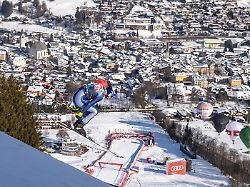Last exit “Super League”
Ski “rebels” rage against controversial FIS plans
March 12, 2024, 3:13 p.m
In skiing, a power struggle is raging between the FIS and national associations. The bold vision of the controversial President Johan Eliasch is putting the scene to the test. A possible “Super League” serves as a threatening backdrop. However, there are also signals of de-escalation.
The beautiful new ski world shimmers and sparkles. At least in Johan Eliasch’s wild dreams. Prize money in the millions like in tennis, a global racing series like in Formula 1, also for the young streaming audience in the growth markets of America and Asia – and if possible all year round, detached from major and stressful climate issues. But everything in the name of sustainability, of course.
The bold vision of the controversial FIS President is putting the scene to the test. The investigative WDR format “Sport inside” reports on a “raging power struggle over international skiing.” If you follow the world association, the front runs between the progressive innovator Eliasch and the crusty, all-too-European forces of insistence. The most important point of contention: marketing. The threatening backdrop of the “rebels”: an independent “Super League” of skiing.
The fuse is on the powder keg
After his re-election in May 2022 – which some associations questioned for procedural reasons – Eliasch himself put the fuse on the powder keg that now threatens to explode. He said he had “a clear mandate for change”, and that the FIS had to be there for all of its members and move away from the association of the “chosen few”, i.e. the Europeans. To do this, he wants to centralize marketing. This question, he emphasized, is no longer about if, but only about how and when.
That was a declaration of war on the associations that have so far marketed their World Cups themselves. “The FIS,” said Eliasch, “owns the rights and is fully entitled to act with them as we wish.” But his proposal in this regard is rejected by his opponents as financially unsatisfactory. The criticism is based on the calendar planning as well as on the supposed “equalization” because top events like Kitzbühel are put on the same level as smaller events. Another accusation: Eliasch has no heart for the Nordics and has not attended a single World Cup there. The FIS said he was “planning” to do so.
Several Central European and Scandinavian associations have formed an interest group against Eliasch’s gigantic ideas, including the DSV and the ski nations Austria, Switzerland, Italy, Norway and Sweden. The group organizes 65 percent of the World Cup competitions – after a possible break with the FIS, will it be independent of the world association in the future? A kind of Super League, said DSV board member Stefan Schwarzbach, “was discussed as a possible construct some time ago, but that is definitely not our preferred model.” One or two disciplines would “suffer massively” from such a rift with the FIS, so the goal is “still” to find a solution with the world association.
Doubts about the “apostates” remain high
In principle, said Schwarzbach, there is “a lot to gain” from central marketing. The associations also see the need for modernization. But they don’t want to let the FIS take advantage of them when it comes to distributing money. A meeting about three weeks ago in Zurich was intended to smooth things over. “We expressed our concerns and concerns and brought in ideas,” said Schwarzbach about the “constructive conversation in a reasonable atmosphere.” Eliasch definitely heard the other side and even showed “understanding”. A second round is to follow on the sidelines of the Alpine World Cup final in Saalbach-Hinterglemm (from Saturday).
But doubts among the “apostates” remain great. Quite a few see the basis of trust with Eliasch as destroyed. If there is no solution, ÖSV general secretary Christian Scherer has already threatened, “we will have to think about alternative concepts” – the Super League. The former ÖSV president Peter Schröcksnadel sees “the right time” for this and told WDR: “That would be fantastic.”
